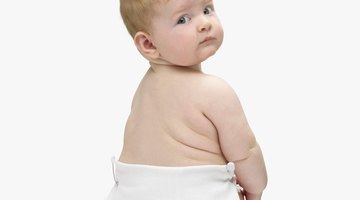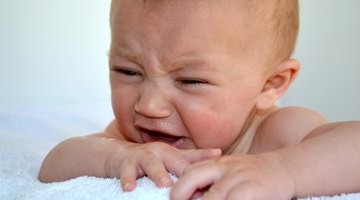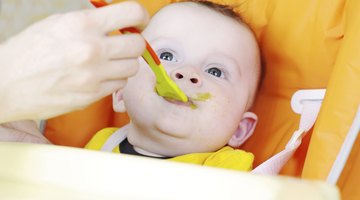Weight Loss in Newborn Babies After Birth
It's easy for new parents to worry about every detail of their newborn's health -- including his weight. Most newborns lose weight in the first few days after birth, for a number of reasons. Weight loss of less than 10 percent of birth weight during the first week is considered normal. If your baby loses more than this, there may be cause for concern. A variety of issues, from breastfeeding problems to physical illness, can cause excessive weight loss in your baby's first days of life.
Normal Weight Loss
Babies spend their time before birth immersed in fluid, so they emerge from the womb somewhat waterlogged. After birth, babies lose the extra fluid and the weight that goes with it. Babies also need a few days to master breast or bottle feeding, during which time they may lose some weight. These typical reasons for weight loss may cause a weight loss of up to 10 percent of the birth weight during the first week. Normal weight loss is temporary. About 95 percent of bottle-fed babies will regain their birth weight by 14.5 days, and 95 percent of breastfed babies by 18.7 days, according to a study in the November 2003 issue of "Archives of Diseases in Children Fetal & Neonatal Edition."
Excessive Weight Loss

Rapid Breathing in Newborns
Learn More
If weight loss is more than normal, it is usually due to prolonged feeding problems. This is more common in breastfed babies because it takes 3 to 5 days for your milk to come in after birth. Furthermore, babies usually have to exert more effort to obtain milk when they are breastfed. More than 10 percent of breastfed babies lose 10 percent or more of their birth weight before they start to regain weight, according to an article published in “Breastfeeding Medicine” in August 2010. Indeed, losing 10 percent or more is often considered a reason to supplement breastfeeding with bottle feeding, according to the article's authors. Rarely, excessive weight loss can result from an infection or medical conditions like metabolic disease, heart, lung, or kidney problems.
Weight Loss and Dehydration
If your baby loses an excessive amount of weight after birth, this often reflects inadequate fluid intake, which can lead to dehydration. Dehydration increases the risk of developing newborn jaundice, a condition in which bilirubin -- a substance produced by the breakdown of red blood cells -- isn't effectively removed from the body. Jaundice gives skin and the whites of the eyes a yellowish tinge and can also cause lethargy. Dehydration can also increase the risk of high sodium levels in the blood. This can lead to a slow heart rate or periods of apnea, in which an infant stops breathing.
When to Seek Medical Attention

How to Calculate Percentile Weight Loss for Infants
Learn More
Seek emergency medical care if your newborn baby has a fever, will not feed or seems lethargic. Also seek attention if she has signs of dehydration, such as fewer than 6 wet diapers per day, dry lips or eyes, loose skin, or if the soft spot on her head is sunken.
Related Articles
- Breastfeeding Medicine: First-Day Newborn Weight Loss Predicts In-Hospital Weight Nadir for Breastfeeding Infants
- Archives of Diseases in Children Fetal & Neonatal Edition: Neonatal Weight Loss in Breast and Formula Fed Infants Fetal and Neonatal Edition
- Fetal and Neonatal Physiology; Richard A. Polin, et al.
- NMS Pediatrics, 5th Edition; Paul H. Dworkin, MD, and Paula S. Algranati
- Neonatal Jaundice: NICE Clinical Guidelines, No. 98
- Pediatrics: Breastfeeding-Associated Hypernatremia: Are We Missing the Diagnosis?
- Infant and Young Child Feeding: Model Chapter for Textbooks for Medical Students and Allied Health Professionals; Management of Breast Conditions and other Breastfeeding Difficulties
- Breastfeeding Basics: How Can I Tell if My Baby Is Getting Enough Milk?











